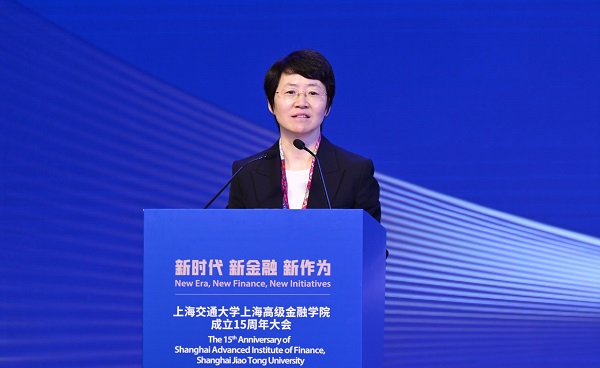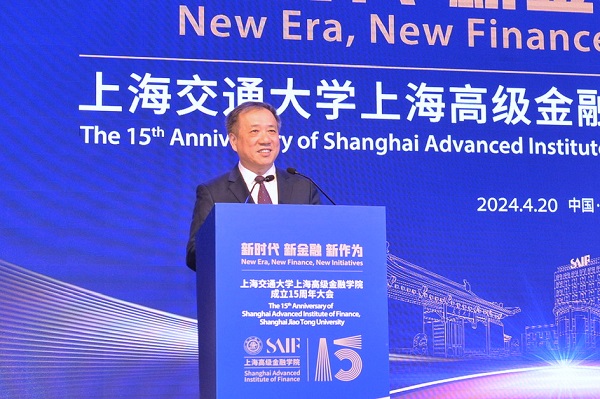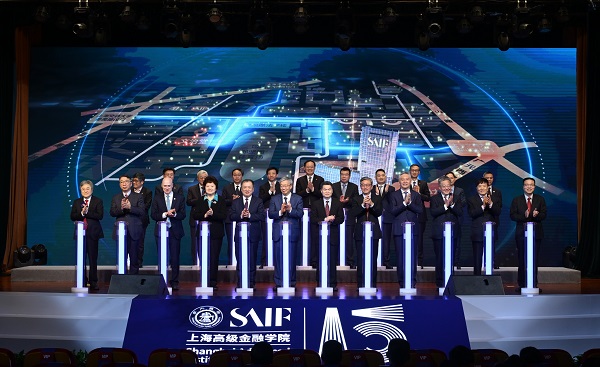Event Overview
On April 20th, the Shanghai Advanced Institute of Finance (SAIF) at Shanghai Jiao Tong University commemorated its 15th anniversary with a conference held at the Xuhui Campus. Nearly 700 distinguished guests convened, including representatives from government entities, financial institutions, enterprises, universities, as well as SAIF faculty, students, and alumni.
Notable attendees included Gang Yi, Member of the Standing Committee of the National Committee of the Chinese People's Political Consultative Conference and Deputy Director of the Economic Committee; Xinghai Fang, Vice Chairman of the China Securities Regulatory Commission; Dong Xie, Vice Mayor of Shanghai; Zhenbin Yang, Secretary of the Communist Party of China (CPC) Shanghai Jiao Tong University Committee and Deputy Director of the SAIF Board; Guangshao Tu, Executive Director of SAIF; and Franklin Allen, Acting Dean of the Imperial College Business School, SAIF Board Member, and Former President of the American Finance Association.
Opening Remarks
The conference commenced with Xinan Zhang, Secretary of the CPC SAIF Committee, presiding over the proceedings. Guangshao Tu, on behalf of SAIF, delivered an address reflecting on the institute's accomplishments over the past 15 years, highlighting achievements in faculty recruitment, talent cultivation, platform development, and think tank establishment.

Institutional Support and Collaboration
Established in 2009 by the Shanghai Municipal People's Government to realize the national strategy of developing Shanghai into an international financial center, SAIF's rapid growth has been facilitated by the guidance and support of the municipal government. Vice Mayor Dong Xie extended congratulations on behalf of the Shanghai government, while Zhenbin Yang welcomed SAIF's faculty, students, staff, and alumni.


SAIF has also received endorsements from numerous domestic and international institutions. Representatives from Peking University, China Europe International Business School (CEIBS), and the Wharton School at the University of Pennsylvania conveyed their well-wishes during the event. Congratulatory letters were received from various schools and colleges within Shanghai Jiao Tong University, including the Guanghua School of Management at Peking University, the School of Management at Fudan University, the School of Aeronautics and Astronautics, the School of Biomedical Engineering, the Antai College of Economics and Management, and the KoGuan Law School.
SAIF's Achievements and Future Outlook
Shijun Cheng, Executive Dean of SAIF, presented a report summarizing the institute's accomplishments over the past 15 years. Empowered by Shanghai and Shanghai Jiao Tong University, and through innovation in systems and mechanisms, SAIF has continuously explored areas such as talent recruitment, education and training, think tank construction, and international exchanges. The institute has forged a path towards internationalized, market-oriented, and professionalized financial management education with Chinese characteristics.
To achieve its three-phase goal of becoming a world-class institution leading in Asia, SAIF will continue to prioritize faculty development, top think tank construction, and the new building project.
Remarks from Faculty, Alumni, and Students
Speeches were delivered by representatives from SAIF's faculty, alumni, and student body, including Professor Jun Pan (SAIF Chair Professor and Chair of the Faculty Council), Liquan Fu (Member of the SAIF CEO Program and Chairman of Zhejiang Dahua Technology Co., Ltd.), and Bin Wu (Master of Finance, Class of 2022).
Honoring Contributions and Unveiling the New Building Project
During the event, SAIF honored 38 individuals who have made significant contributions to the institute's development over the past 15 years. These included former directors of the SAIF Board, members of the first SAIF Board, veteran leaders instrumental in SAIF's founding, previous SAIF Board members, and founding professors. Additionally, staff members who have made outstanding contributions since SAIF's inception were awarded the Distinguished Service Award.
To accommodate SAIF's rapid growth and expanding think tank research, a new building project was unveiled. With the vigorous support of the Shanghai Municipal People's Government and Shanghai Jiao Tong University, the new building will be constructed on the Xuhui Campus, with a planned total area of 33,000 square meters. Construction is scheduled to commence in 2025 and is expected to be completed by 2027, providing a solid foundation for SAIF's pursuit of becoming a world-class financial institution.

Keynote Addresses
In his keynote address, Gang Yi elucidated the "Framework of Sound Monetary Policy," presenting a framework description of China's monetary policy regulation in recent years and explaining the underlying logic and operational mechanisms.
Yi proposed that interest rate policies, as the core of monetary policy, and exchange rate policies should adhere to the principles of a market economy. This approach is crucial for maintaining economic and financial stability while curbing systemic financial risks at the macro level.
According to Yi, China's recent monetary policy has consistently prioritized the Chinese yuan (CNY) as the dominant factor, taking into account time lags and other complex factors in regulation and control. The policy focuses on cross-cycle regulation and cross-regional balance, keeping monetary policy within a normal range. The real interest rate is roughly matched with the potential economic growth rate, and the more flexible CNY exchange rate promotes macroeconomic stabilization.
Overall, China has maintained the stability of its economic and financial system while promoting high-quality economic development through relatively smooth and less costly monetary policy operations.

Franklin Allen shared his perspectives on China's Financial System Architecture. Traditionally, he noted, financial economists tend to analyze different sectors of the financial system separately, often separating banks from stock and bond markets. However, Allen emphasized that the interactions between sectors are as essential as the key drivers within each sector.
To illustrate, if the equity market underperforms while the real estate market outperforms, funds might flow from the equity market into the real estate market, exacerbating the performance differential and leading to a misallocation of resources. Consequently, Allen argued that to achieve a balanced financial system architecture, regulators must comprehensively consider the differential impact of policy adjustments on various markets. Furthermore, he advocated for continued reform of the capital market to enhance returns, thereby encouraging more investment in the stock market and promoting innovation in the economy.







